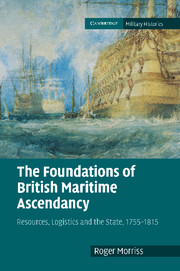Book contents
- Frontmatter
- Contents
- List of tables
- Preface
- Glossary of British weights, measures, casks and money values
- List of abbreviations
- Introduction
- 1 The British state in evolution
- 2 Defence and expansion
- 3 Economy and finance
- 4 Naval growth and infrastructure
- 5 Ordnance and technology
- 6 Manpower and motivation
- 7 Foodstuffs and victualling
- 8 Shipping and transportation
- 9 The supply of land forces overseas
- Conclusion
- Bibliography
- Index
- References
6 - Manpower and motivation
Published online by Cambridge University Press: 10 January 2011
- Frontmatter
- Contents
- List of tables
- Preface
- Glossary of British weights, measures, casks and money values
- List of abbreviations
- Introduction
- 1 The British state in evolution
- 2 Defence and expansion
- 3 Economy and finance
- 4 Naval growth and infrastructure
- 5 Ordnance and technology
- 6 Manpower and motivation
- 7 Foodstuffs and victualling
- 8 Shipping and transportation
- 9 The supply of land forces overseas
- Conclusion
- Bibliography
- Index
- References
Summary
As a maritime nation, the British should not have lacked for manpower to serve its navy. But the latter had to compete for men with the merchant service, with the army and militia, and with civil employments. Moreover, the state's armed forces had to grow rapidly at the beginning of hostilities and demands for manpower grew in every war between 1755 and 1815. Before 1763 only about 5 per cent of the male population was mobilised for war. By 1811, about 6 per cent were in the regular armed forces, the army and the navy, and another 4 per cent in the militia and volunteers. The state took this 10 per cent from agriculture, manufacturing, construction and commerce, giving Britain a higher ratio of men in the military forces than any other European nation. However, recruitment was a challenge. Methods for the army increased in variety but those for the navy did not. The proportion impressed for the navy was persistently high. But so also was the rate of desertion. The navy's death rate declined, not only due to medical and dietary improvements but because rates of discharge increased far more. This made for a more efficient workforce, yet one that demanded management and motivation, for recruits naturally had their own personal interests and prejudices. Methods of management thus mattered, not least because they formed attitudes to the state.
- Type
- Chapter
- Information
- The Foundations of British Maritime AscendancyResources, Logistics and the State, 1755–1815, pp. 223 - 270Publisher: Cambridge University PressPrint publication year: 2010



